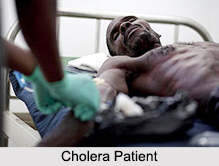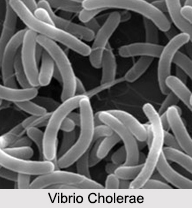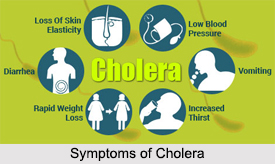 Cholera is one of the most severe stomach diseases, mainly of the intestines, which affects the lower part of the small bowels especially during the monsoons, since it is water borne disease. The disease strikes suddenly and fills the intestinal canal with bacilli, which die rapidly and leave the person quickly either alive or dead, thus the mortality rate of this disease is much higher.
Cholera is one of the most severe stomach diseases, mainly of the intestines, which affects the lower part of the small bowels especially during the monsoons, since it is water borne disease. The disease strikes suddenly and fills the intestinal canal with bacilli, which die rapidly and leave the person quickly either alive or dead, thus the mortality rate of this disease is much higher.
History of Cholera
Cholera likely has its origins in the Indian Subcontinent; it has been prevalent in the Ganges delta since ancient times. It is believed that the first origins of Choleras have occurred due to the result of poor living conditions as well as the presence of pools of still water.
Causes of Cholera
Cholera is caused by a short, curved, rod-shaped germ known as Vibrio Cholerae. This germ produces a powerful poison which is spread by flies and water contaminated by the germs. The real cause of the disease, however, is the toxic and devitalized condition of the system brought about by incorrect feeding habits and faulty style of living. This condition facilitates the breeding of the cholera germs.
Symptoms of Cholera
Symptoms may range from none, to mild, to severe. The symptoms of cholera are clearly visible in three stages.
First Stage:
•The patient suffers from mild diarrhoea and vomiting, which worsens rapidly.
•The motions become watery, containing no faecal matter.
•The patient experiences severe cramps in the abdominal muscles and limbs, resulting due to lack of salts.
•The temperature of the body rises but the skin is generally cold and blue and the pulse gets weak.
Second Stage:
•Here, the body becomes colder, the skin dry, wrinkled and purple.
•Voice becomes weak and husky.
•The urine looks dark and formation is less, or altogether absent.
•It is in this `algid` stage that the patient may die, as early as 24 hours after the onset of the symptoms.
Third Stage:
•In this stage, a gradual recovery follows in favourable cases. All the changes seem to reverse themselves.
•The fluid loss decreases and there is improvement in the general condition.
•Even at this stage, a relapse may occur or the patient may sink into a condition resembling typhoid fever.
•The condition may deteriorate over a period of 2 or 3 weeks. During this stage of reaction, the temperature may rise, and the patient may be in danger of pneumonia. 
Treatment of Cholera
The treatment should begin with the aim of combating the loss of fluids and salts from the body.
•To allay thirst, water, soda water or tender coconut water should be given in small quantities repeatedly for sipping.
•Ice may be given for sucking as it will reduce internal temperature and restrict the tendency to vomit.
•Intravenous infusions of saline solution, maybe 5 litres or more, should be given as a compensation for the loss of fluids and salts from the body.
•Rectal saline normally, half a litre of saline, with 30 grams of glucose, should be given per rectum every 4 hours until urine is passed freely. This treatment may sometimes prove useful for adults.
After the acute stage of cholera is over, the patient may be given tender coconut water and barley water in very thin form. When the stools begin to form, he should be given buttermilk. As he progresses towards recovery, rice softened to semi-solid form mixed with curd, may be given. However, the patient should not be given solid food till he has fully recovered. Liquid and bland foods are the ones, which the patient can ingest without endangering a reoccurrence of the disease. Lemon, onion, green chillies, vinegar and mint should be included in the daily diet during an epidemic of cholera.
Prevention from Cholera
Though cholera can be treated, it should be prevented first in order to escape the pain of this horrible disease. Cholera can be controlled only by rigid purification of water supply and proper disposal of human wastes. In case of slightest doubt about the contamination of water, it must be boiled before use, for drinking and cooking purposes. Foodstuffs must be kept covered and vegetables and fruits washed with a solution of potassium permanganate before consumption.
Other precautions against this disease include avoiding all uncooked vegetables, thorough washing of hands by all those who handle food, and elimination of all contacts with the disease.




















